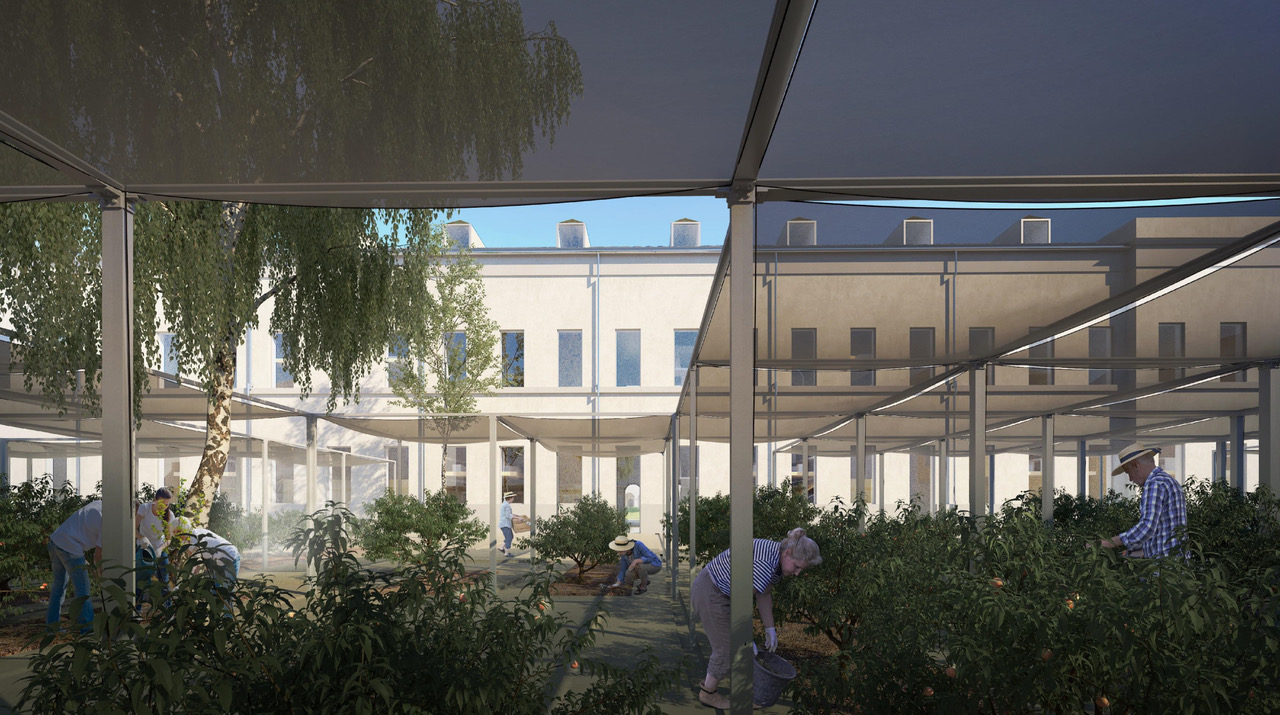FUTURE PLACES, Brussels, 2020-2030
Tutor: Roeland Dudal
Engagement: Urban Cultures / The Brussels Way
Academic year 21-22, semester 1, Campus Brussels
Language: English
Image: Pacheco Institute, agriculture on site, Mantas Povilaika, studio: The Now and The Next BXL 2040.
Context and approach
The policy plans of both the municipal and regional authorities in the Brussels Capital Region are promising. For instance, the City of Brussels is currently drawing up a new spatial policy plan, in which citizens will also be involved, as well as they are preparing new mobility plans, a water plan, a climate plan, positive energy districts and so on. The reactions to the transformation of the central avenues of Brussels are generally positive. Many new projects are underway, such as the transformation of the former Actiris building or the new ZIN office tower. Also, regional politicians claim an ambitious future for the capital of Europe, giving shape to the Good Food, Good Move, #BeCircular and Renolution transition programmes. It all looks bright.
But is Brussels really ready to accommodate the major social transitions that lie ahead? The mobility policy is not getting enough grip on the modal shift to the mobility of the future, with safe traffic in healthy air. Who will pay the bill for the transition to sustainable energy districts, for which thousands of buildings will have to be renovated? What are the models to make housing affordable and neighbourhoods socially inclusive? How can the green and water policy arm the city against the effects of climate change, such as heat islands, droughts, and floods? Where to host the urban economy in the future?
In this studio we will confront our discipline with the now and the next of our society. The COVID19 pandemic, the floods, the forest fires have once again – and this time boulder hard – made many people face the facts. The way in which we organize and shape our lives (living, working, leisure, …) is under high pressure. We are (rightly) concerned whether the current global economic model, the current forms of democracy and our gigantic ecological footprint are the right systems to make living conditions at least as good or better for future generations. The depletion of Mother Earth’s resources, the lack of redistribution of wealth, migratory pressures, global warming, drought, and access to (drinking) water, … these are just some of the problems we are getting a better picture of, but which we feel increasingly powerless against.
However together with many experts in various fields (mobility, energy, sociology, …), architects and urbanists have beautiful building blocks in their hands to realize the necessary big yards of society, the future places in which we want to see our children and grandchildren grow up. Imagining and designing the streets, the buildings, the neighbourhoods, the city and the landscape that we want and are able to want, as a sum of all kinds of small and large projects, that is the plan for the future that many architects want to help build.
Architecture is storytelling. Therefore, we need to collect stories on the one hand and scale them up on the other hand, so to arrive at new socio-spatial practices.
Image: Pacheco Institute, front corpus interior, Mantas Povilaika, studio: The Now and The Next BXL 2040.
Studio Set Up
The studio work starts from a critical exploration of the expected future of the very diverse neighbourhoods of Brussels. We evaluate the impact of the envisioned objectives on our society. We explore the impact of the ongoing societal transitions on the architecture and the public space of the city. Is this the future we want?
This studio will take the hypothesis and the agenda of the cultural online platform The Great Transformation (www.thegreattransformation.eu) as a backdrop. The Great Transformation 2020–2030 is an independent learning environment, incubator, and public programme. Enterprising citizens, governments, businesses, financiers, scientists, and organisations work on actual breakthroughs and achievements. Using design and the power of the imagination, we are forming coalitions and formulating strategic sites that can be developed between now and 2030. The Great Transformation works on the conception of Future Places. If we can develop them in many locations simultaneously, they will constitute the greatest transformation project of our time and we will succeed in the necessary transition of our living environment. Can we bundle our strengths to replicate change?
The first phase (7 weeks) of the semester will be organized as a collective work. We select and explore the most appropriate Future Places based on a first scan of a selected territory’s challenges and opportunities. By analysing the building stones of the Future Places (via reference projects) we project a multiplication of impact on the selected territory. This will lead to an Atlas of Future Places for (a part of) Brussels.
In order to achieve the above-mentioned multiplication, we have to invent. We will need to design Future Places tailored to Brussels. We need to organize the interaction between public and private forces differently. We have to invent new typologies of buildings and reclaim public spaces. We need to rethink real estate models and ownership in the city. Step by step, we are looking for the conditions for a decisive and inclusive Brussels 2030 alliance, as an accumulation of Future Places. Design research on an architectural scale will demonstrate how we can tune the future of the city by taking smart decisions today. This will be the second phase of the semester (7 weeks). Every student will need to develop an individual design on an architectural (human) scale, within the collective vision.
External links:
Image: Pacheco Institute, inner open courtyard, Mantas Povilaika, studio: The Now and The Next BXL 2040.
Studio description (pdf)

